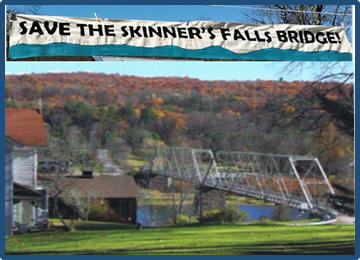EPA close to launching hydraulic fracturing study
February 3, 2011Incidents where hydraulic fracturing is a suspected cause of drinking water contamination
February 15, 2011Groups File Federal Gas Drilling Lawsuit against DRBC; Delaware River Basin Commission Served Notice; Federal Circut Judge Assigned to Case – [Court Date To Be Announced]: Honorable Anne E. Thompson.
United States District Court for the District of New Jersey Trenton, New Jersey 30-page PDF document [Full Complaint and Legal Filing]
Scranton Times-Tribune, “Environmental groups Sue Delaware River Basin Commission”
The River Reporter, “Groups file lawsuit against DRBC.”
Trenton, New Jersey —The Delaware Riverkeeper Network and Damascus Citizens for Sustainability have joined forces in filing a federal lawsuit against the Delaware River Basin Commission (DRBC) in federal district court in Trenton, NJ. Complaints were served on the DRBC today. The conservation groups are challenging the actions the DRBC took to allow certain exploratory natural gas wells to be drilled without DRBC review and approval and despite a Basin-wide moratorium on gas wells.
In May, 2009, Carol Collier, Executive Director of DRBC, issued a determination requiring individual review by the Commission of each shale gas production well. A year later the Commission decided to defer action on all gas production wells until regulations are adopted by the Commission to protect the Basin’s water resources. But the Commission left open a loophole for exploratory wells created by the 2009 Executive Director Determination. In June, 2010, the Executive Director issued a supplemental determination that closed the exploratory well loophole. However, in this exploratory well determination, the Executive Director exempted wells that had obtained state drilling permits while the loophole was in effect. These wells are referred to as “grandfathered” wells.
“The drilling of a gas well, whether exploratory or production, has serious environmental impacts. Since the DRBC is supposed to protect the River and the clean drinking water for over 15 million people, they shouldn’t have allowed these wells to proceed without DRBC oversight. These wells threaten pollution and may have already caused pollution. We want these wells removed and the land restored,” said Maya van Rossum, the Delaware Riverkeeper.
At its July, 2010, meeting, the Commission granted a number of hearing requests challenging different aspects of the executive director’s exploratory well determination. One of the requests granted was a challenge by the conservation groups to the “grandfathered” wells reservation. The hearing was supposed to examine whether the Executive Director exceeded her authority when she excluded the grandfathered wells from DRBC regulation.
The DRBC also ignored the National Park Service by not reviewing the grandfathered wells. The Park Service had invoked its authority under the DRBC’s rules to refer all exploratory wells to the DRBC for review, and Ms. Collier had no authority to allow any exemptions from this federal referral.
In accordance with pre-hearing procedures directed by the hearing officer, the conservation groups obtained and submitted a series of nine reports from experts on issues related to the pollution risks associated with drilling the grandfathered exploratory wells, which are essentially vertical gas wells that are not yet hydraulically fractured but which inflict all the impacts of well construction and drilling, including the use of drilling chemicals in fragile geology, the clearing of land in ecologically sensitive areas, and the installation of an industrial operation in rural landscapes. Moreover, the wells, in what may be environmentally risky locations, can become long-term production wells. The expert reports showed clearly that state regulations are not adequate to prevent pollution from the grandfathered wells; that groundwater, streams, and the main stem River would pay the price; and that the wells would violate the DRBC’s anti-degradation requirements.
“When the Commission terminated the hearing process, it forced us to go to court to uphold the protection the Compact provides for the critical water resources for New York City, Philadelphia and all the other communities and water supply systems that depend on the Delaware River for water,” said Barbara Arrindell, director of Damascus Citizens for Sustainability. She continued, “The proper process would be to look first, before allowing any wells, at the cumulative impacts that would be produced by this type of industrial development, It certainly is wrong to allow these gas wells without any review whatsoever. The DRBC does not exist to facilitate the aims of the drillers.”
The conservation groups allege that the DRBC Executive Director’s actions on the grandfathered wells were arbitrary, capricious, an abuse of her discretion and in violation of applicable law in the Compact and the Commission’s administrative Rules of Practice and Procedure. The complaint asserts that by terminating the hearing process before the hearing could be held, the Commission violated the conservation groups’ due process rights.
The conservation groups seek relief in the form of a declaratory judgment that the Commission and the Executive Director violated applicable law, that no further exploratory wells should proceed, and that the already drilled wells were wrongly allowed, should be removed, and the sites cleaned up and restored to natural conditions.
The DELAWARE RIVERKEEPER, and DAMASCUS CITIZENS FOR SUSTAINABILITY
COMPLAINT FOR DECLARATORY AND INJUNCTIVE RELIEF
vs
DELAWARE RIVER BASIN COMMISSION and
CAROL COLLIER,
Executive Director, Delaware River Basin Commission (sued in her official capacity) and DELAWARE RIVER BASIN COMMISSION, Defendants
30-page PDF document [full Complaint and Legal Filing]:



